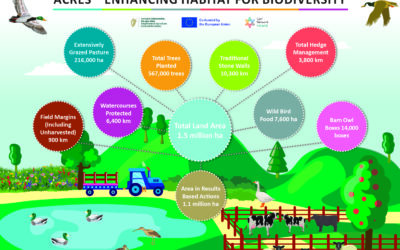ACRES
Pillar 2
General Overview:
Agri-Climate Rural Environment Scheme (ACRES) is Ireland’s latest agri-environment climate initiative under the country’s CAP Strategic Plan (CSP). This is a flagship environmental program within Ireland’s 2023-2027 CAP Plan and aims to combat biodiversity decline while providing income support to a target of 50,000 farm families across Ireland.
Phased Rollout:
ACRES will roll out in phases, with a minimum of two tranches. All valid applications submitted for Tranche 1 have been accepted into the scheme, and the contracts commenced on the 1st of January 2023. Tranche 2 was announced on the 24th of November 2023 and had a target of an additional 4,000 participants. This was made possible by securing additional funding under budget 2024.
Scheme Specific Details:
ACRES General and Acres Co. Operative.
There are two ACRES branches in which you can apply for. Both carry their own set of requirements.
1. General: Available nationally (outside of the high priority geographical area defined for the ACRES Co-operation approach) and offers a range of actions for individual farmers, both targeted and general.
You may only apply for the ACRES General if your holding falls outside of the high priority geographical area as defined for the ACRES Co-operation approach.
2. Co-operation: Available to farmers in defined high priority geographical areas and involves results-based payments as well as bespoke farm and landscape actions. Contracts have been awarded for the management of Co-operation Projects (CP), and farmers will be supported by new teams, who will develop local action plans for their zones.
You may only apply for the ACRES Co-operation approach if you have 3 hectares or more or 20% or more of your farm holding – whichever is the lower – declared as forage/habitat in the 2021 Basic Payment Scheme (BPS) within ACRES Co-operation area.
Both approaches require the preparation of a Farm Sustainability Plan to be completed and submitted by an ACRES approved Agricultural advisor.
Budget:
Total allocated ACRES budget for CSP 2023″“2027: €1.5billion
Resources:
To learn more about ACRES, please visit the Department of Agriculture, Food and the Marine’s website.
To read about the terms and conditions, see this link:

